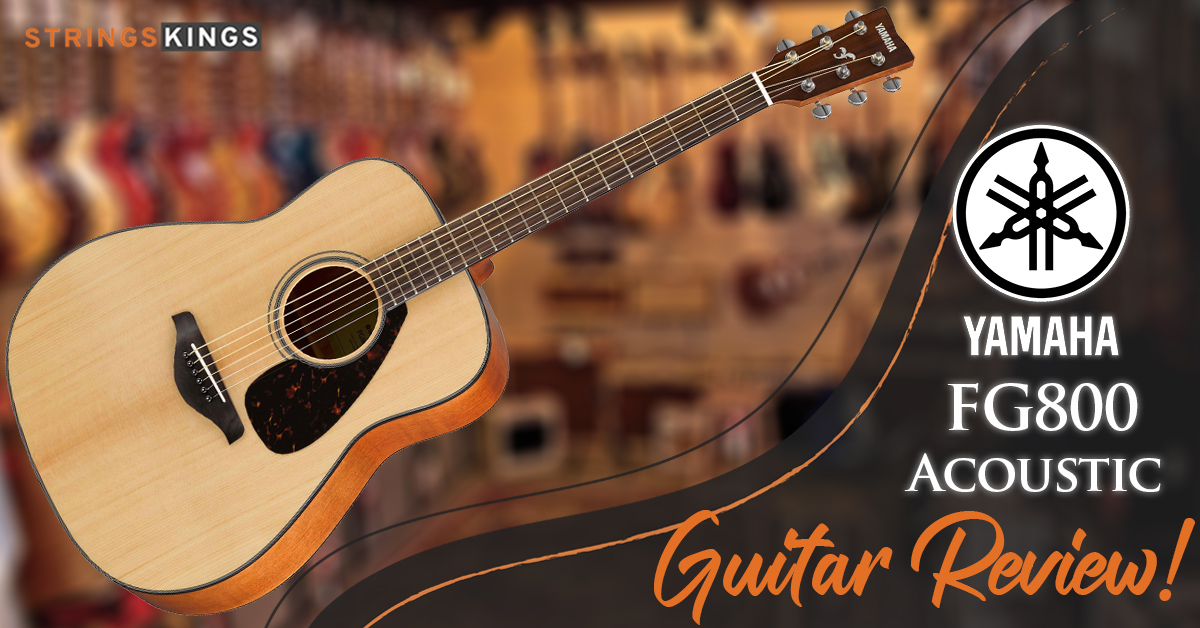Table of Contents
Ukulele vs Guitar
Introduction
The traditional lute was the forerunner of each guitar and ukulele. These string instruments’ look and use have diverged over time, and they’re two completely different types nowadays.
Due to this fact, you may see quite a few similarities between these two. Important variations end in varied sounds, methods of playing, and purpose.
Generally, it’s not simple to resolve which one to choose, so it’s best to determine all the ukulele vs guitar benefits and downsides.
Fortunately, you may shortly switch from one instrument to a different one when you learn methods to play. Let’s see how to make the precise choice.

Ukulele vs Guitar: Historical past
The guitar and ukulele are two very fashionable instruments, nonetheless, guitars have been extra integral within widespread culture and music than the ukulele.
The guitar is commonly thought of to be an extra-critical instrument than the ukulele. Though that is starting to change, with plenty of extraordinarily challenging and distinctive music being created for the ukulele on more recent occasions.
Ukulele Origins
The name ukulele has conventional Hawaiian origins. It was given to a small instrument known as the machete which was initially created within the Medina Islands of Portugal.
As the story goes, the ukulele was introduced by Portuguese immigrants. Legend has it that the ukulele was delivered to the island by Englishman Edward William Purvis in the 1880s.
Finally, the ukulele is a modified model of different Portuguese string instruments. Not long after being delivered to the island, the ukulele quickly grew to become probably the most popular instrument around. This led to the manufacturing of cheap models which gave many individuals access to them.
It grew in recognition on account of its affordability and its small size. Hundreds of those instruments have been manufactured all through the 1920s and it grew to become one of many musical icons of the time.
Nevertheless, through the 1930s, the ukulele slowly declined in recognition. It was later revived in the late 1940s to 1950s when American servicemen introduced the instrument home with them from Hawaii after World War II.
At present, the ukulele is a very fashionable instrument all over the world. Though once related to conventional Hawaiin music, it’s now integral to numerous different cultures and has changed into very popular in lots of musical settings.
Guitar Origins
The guitar is a noble and historical instrument that’s believed to have originated over 4000 years ago. Whereas there are various theories about how the instrument took place, it’s usually claimed that the guitar was created from the lute and even the traditional Greek kithara.
The instrument had a deep box-shaped body. Two hollow arms have been related by a crossbar that is prolonged from the resonator. Initially, the instrument had three strings, nonetheless, later variations had as many as 12.
There’s a theory that a man named Lamech, Noah’s grandfather, and the sixth grandson of Adam and Eve, designed the guitar.
Lamech was apparently impressed to design the form of the instrument often known as the oud after hanging the body of his lifeless son from a tree.
The Moors introduced the oud with them once they invaded Southern Spain in 711 AD.

Ukulele Vs. Guitar: Variations in Sound
If you choose up to two guitars, they don’t sound identical, right? The variations between a guitar and a ukulele turn out to be much more pronounced in case you swap from acoustic to electric guitar or vice-versa.
Realizing all that, the sound expectations we’re about to explain for you’re generalized on purpose. We don’t need you considering you’ll get one kind of sound out of a guitar vs ukulele after which being disappointed.
The very best factor to do is discover the respective worlds of guitars and ukes till you discover an instrument that fits your tone and sound best.
That mentioned, let’s get into what sorts of tone you possibly can anticipate when playing guitar in comparison with a ukulele.
Guitar
By measurement alone, guitars can produce a louder sound than ukuleles ever can. Utilizing a pick can improve your volume much more, which is one thing you don’t get with ukes.
Whenever you play with a pick, you may additionally notice a brighter sound out of your guitar, one other quality that many individuals use when describing what a guitar sounds like.
You may switch between sounds effortlessly with a guitar relying on which guitar type you select, the amp you utilize, and the tone you’re aiming for.
For example, you possibly can go simply as soft and dreamy with a guitar as you possibly can with a ukulele, however, you’d need an acoustic guitar to do it.
Ukulele
If you wish to rock out, the ukulele shouldn’t be the instrument you’d choose to take action.
Ukuleles, pretty much no matter the sort, have a definite sound that’s very tropical and Hawaiian. When you hear somebody playing the uke (otherwise you do so yourself), it’s obtained that one-of-a-kind sound that you just simply don’t get from different instruments.
Given where it comes from, the tone of a ukulele is usually fairly mellow. Some folks like the sound of uke to that of a harp, others say it’s very sweet and quiet (electric ukes excluded).
Ukulele Vs. Guitar: Variations in Size
The obvious distinction between a guitar and a ukulele is a visible one. In case you hold up these two instruments against each other, it’s very clear that the guitar is greater than the ukulele. Simply how huge, exactly?
Whereas it may possibly differ depending on the instrument you select, you possibly can expect a size decrease of 35 to 50 percent from a guitar to a ukulele. Sure, that’s right. In some instances, the ukulele is actually half the size of a guitar.
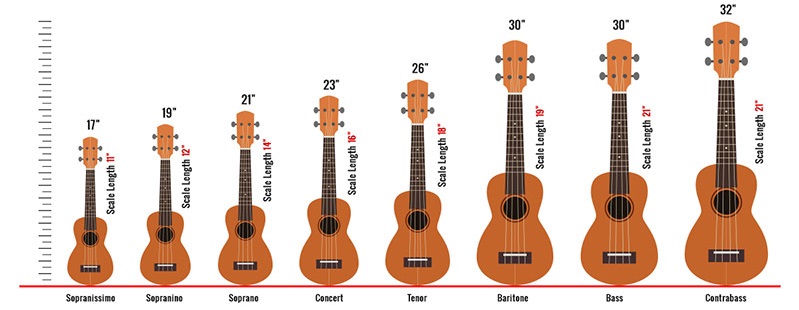
Utilizing averages right here, a guitar has a scale size of 23 to 26 inches whereas it’s solely 13 to 17 inches for many ukes. The body of a guitar can be far bigger, anywhere from 19 to 21 inches.
The tiny ukulele is just 10 to 13 inches. That brings us to the total lengths, of which a guitar is anyplace from 38 to 41 inches long. A ukulele could also be as little as 21 inches and as much as 26 inches long.
There are some advantages to being smaller. We already talked about how dimension can have an effect on tone and sound, but one perk of a ukulele is how transportable it is.
You’ll be able to simply bring it with you nearly anyplace, from a bonfire at sunset to a seashore or pool party. Acoustic guitars are equally as portable, however, they’re extra inconvenient to hold because they’re larger.
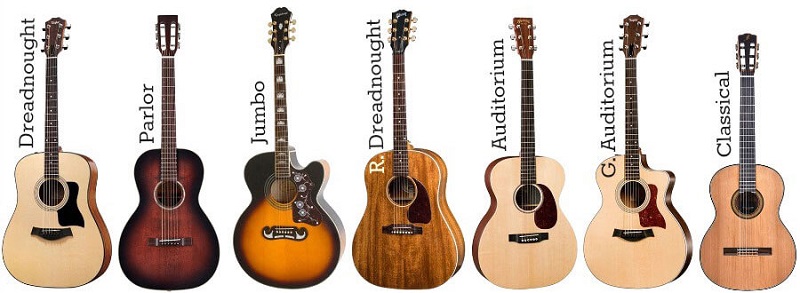
Ukulele Vs. Guitar: Variations in Strings
The string tension may imply that the ukulele strings being simpler to press on make it the extra most popular instrument for younger children as the best choice to start out with when studying to play. Most of the skills discovered with the ukulele may be transferred over to the guitar.
One other distinction you’ll discover with the strings of a guitar is the variety of strings every has. Basic guitars have six strings, whereas, on a ukulele, there are only four.
The additional two strings on an acoustic guitar make a big change when it comes to more guitar chords, scales, and progressions.
While on the uke, you will have easier ukulele chords and shapes, because they are tunned differently due to the number of strings. They also use soft strings that require less string tension and the standard tuning gives ease to form chords on this smaller instrument.
So, the fewer strings on the uke make it extra restricted for chords and scales.
Some alternate string configurations can be found on these musical instruments, similar to a 12-string guitar or an 8-string ukulele. Nonetheless, it’s much less widespread and extra likely that almost all will have the usual six and four strings.
The change in string numbers may even change the chord shapes, scale size, and restrict or broaden the availability of songs to play. Having versatility additionally explains why you see many bands feature guitar players rather than ukulele players for the reason that trendy guitar has a broader range.

Ukulele Vs. Guitar: Tuning
In a nutshell, whereas we tune ukulele strings in a different way than guitar strings, the relationships between these strings are comparable enough that a lot of what you study on one instrument can switch over to the other.
We tune the four strings of the ukulele the identical way as the highest (thinnest) four strings of the guitar with a couple of vital differences.
In customary tuning, the highest four strings on the guitar are tuned D-G-B-E, whereas on the ukulele they’re G-C-E-A. In each circumstance, the connection between the strings is perfect fourth, major third, and perfect fourth.
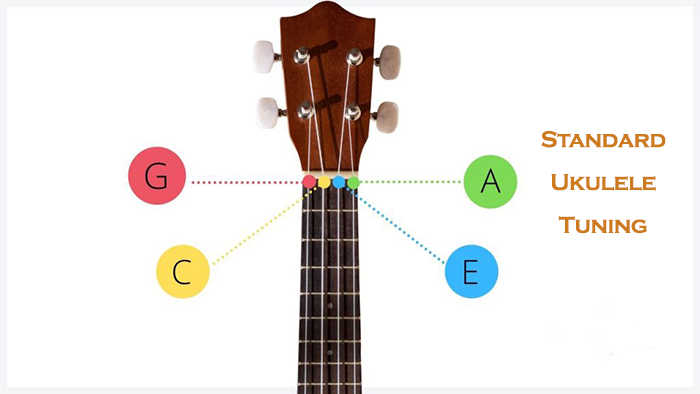
However, there may be one large distinction. On guitar, we tune guitar strings in a linear relationship to each other, which means that every string, from sixth to first, is growing higher in pitch.
However, the fourth string on a ukulele is tuned a full octave higher in relation to the opposite three strings.
In different words, the fourth string on the uke is definitely higher in pitch than the third string. This is called re-entrant tuning, but for the ukulele, it’s usually simply known as standard ukulele tuning.
The close relationship between the 2 instruments is most simply illustrated by evaluating an open D Major chord on the guitar and a G Major chord on the ukulele.
These chords will sound completely different, however, we fret them the identical way. Likewise, the patterns for playing any sort of scale on the highest three strings of the guitar are identical on the highest three strings of the uke, despite the fact that the notes are completely different.
This may all sound a bit complicated, however, the important takeaway is that the 2 instruments are intently related, at the very least when it comes to tuning. The bass guitar is related as well, and the music idea you study on one can switch to the other.
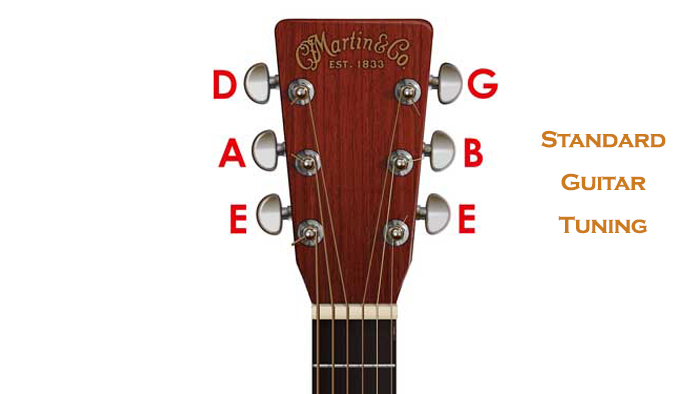
FAQ
Q: Is the ukulele better than the guitar?
A: The ukulele will be seen as better than the guitar for just a few causes. Primarily, because it’s simpler to learn, it’s extra affordable, it’s transportable, they sound good, and popular songs will be simply adapted to be performed on the ukulele.
Q: What’s the distinction between guitar and ukulele?
- Size: The ukulele is way smaller, on average 35% to 50% smaller.
- Strings: A typical guitar has six strings whereas a regular ukulele has four
- Kind of strings: Guitar strings are often made of steel whereas the ukulele uses nylon strings or the same versatile synthetic materials.
- Tuning: The guitar is tuned E-A-G-D-B-E whereas a ukulele G-C-E-A.
- Sound: Guitars are typically louder and brighter whereas ukuleles are usually quieter and extra mellow.
Q: Can I play the ukulele if I play guitar?
Sure! In actual fact, studying the ukulele shall be very simple when you already know the way to play the guitar. The chord shapes are similar on the ukulele to the chord shapes on the highest four strings of the guitar, the one difference is their names.
Q: Is playing ukulele similar to playing guitar?
Undoubtedly! In essence, it’s the same. You simply have fewer strings to strum or pluck and frets to put your fingers on the ukulele. The chord shapes are precisely the same, simply on a smaller scale.
Q: Ukulele vs guitar for a child?
Ukuleles are significantly better for kids than guitars. Because they’re smaller and have only four strings, it means it’s ultimate for kids with smaller palms.
There’s additionally much less string tension making them a lot simpler to hold down and extra comfy on the fingertips.

Conclusion on Ukulele vs Guitar
No matter if it is an acoustic guitar, bass guitar, or classical electric guitar when it is compared to the ukulele, you are definitively looking at two instruments very different, but pretty similar.
The similarity is that both of them are stringed instruments and the main difference is the music theory compared to the modern guitar.
On ukuleles, you are able to find several standard types.
When it comes to guitars, there are acoustic guitars, also standard guitars or classical guitars, electric guitars, and electric bass guitars. Most of them use steel strings or nickel-coated strings.
Both the guitar as a stringed instrument and the ukulele produce the recognizable stringy sound, no matter the playing style. They have fretted instruments and the songs can be adapted between musical genres.
Anyway, we believe that we provided the most important differences between these two stringed instruments and we hope that you will be able to learn something new from our article. If you have any questions, please let us know in the comment section!



